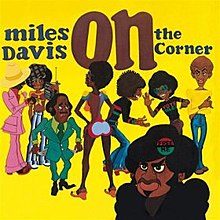| On the Corner | ||||
|---|---|---|---|---|
 | ||||
| Studio album by | ||||
| Released | October 11, 1972 | |||
| Recorded | June 1, June 6 and July 7, 1972 | |||
| Studio | Columbia 52nd Street (New York City) | |||
| Genre | ||||
| Length | 54:41 | |||
| Label | Columbia | |||
| Producer | Teo Macero | |||
| Miles Davis chronology | ||||
| ||||
On the Corner is a studio album by the American jazz trumpeter, bandleader, and composer Miles Davis. It was recorded in June and July 1972 and released on October 11 of that year by Columbia Records. The album continued Davis' exploration of jazz fusion, and explicitly drew on the influence of funk musicians Sly Stone and James Brown, the experimental music of Karlheinz Stockhausen, the free jazz of Ornette Coleman, and the work of collaborator Paul Buckmaster.[1]
Recording sessions for the album featured a changing lineup of musicians including bassist Michael Henderson, guitarist John McLaughlin, and keyboardists Chick Corea and Herbie Hancock, with Davis playing his trumpet through a wah-wah pedal.[2] Davis and producer Teo Macero then spliced and edited various takes into compositions. The album's packaging did not credit any musicians, in an attempt to make the instruments less discernible to critics. Its artwork features Corky McCoy's cartoon designs of urban African-American characters.
On the Corner was in part an effort by Davis to reach a younger African-American audience who had largely left jazz for funk and rock music. Instead, thanks to Columbia's lack of target marketing, it was one of Davis' worst-selling albums, and was scorned by jazz critics at the time of its release.[3][4] It would be Davis's last studio album of the 1970s conceived as a complete work; subsequently, he recorded haphazardly and focused instead on live performance before temporarily retiring in 1975.[5]
Critical and popular reception of On the Corner has improved dramatically with the passage of time.[6] Many outside the jazz community have since called it an innovative musical statement anticipating subsequent developments in styles including funk, jazz, post-punk, electronica, and hip hop. In 2007, On the Corner was reissued as part of the six-disc box set The Complete On the Corner Sessions.
- ^ Troupe, Quincy (1990). Miles: The Autobiography. Simon and Schuster. p. 322. ISBN 978-0330313827. "It was actually a combination of some of the concepts of Paul Buckmaster, Sly Stone, James Brown, and Stockahusen, some of the concepts I had absorbed from Ornette's music, as well as my own."
- ^ Cite error: The named reference
Christgauwas invoked but never defined (see the help page). - ^ Troupe, Quincy (1990). Miles: The Autobiography. Simon and Schuster. p. 328. ISBN 978-0330313827.
- ^ Chinen, Nate (October 11, 2007). "CD Review: Miles Davis, The Complete On the Corner Sessions". Internet Archive. Jazz Times. Archived from the original on October 11, 2007. Retrieved February 11, 2011.
{{cite web}}: CS1 maint: bot: original URL status unknown (link) - ^ Freeman, Philip (2005). Running the Voodoo Down: The Electric Music of Miles Davis. Hal Leonard Corporation. pp. 10, 178. ISBN 1-61774-521-9.
- ^ Cite error: The named reference
Reynoldswas invoked but never defined (see the help page).